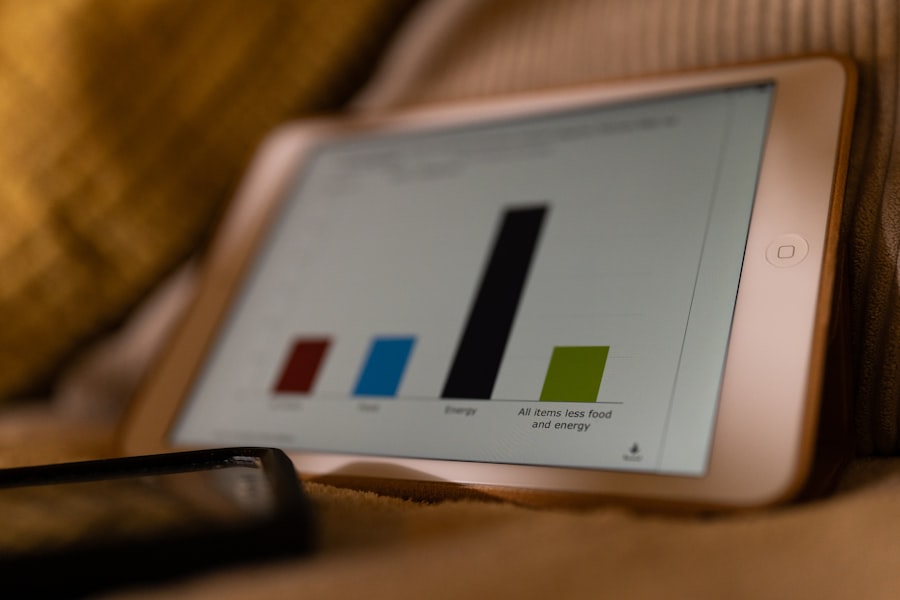Inflation is a term that you may have encountered frequently in discussions about the economy, but what does it truly mean? At its core, inflation refers to the general increase in prices of goods and services over time. When inflation occurs, each unit of currency buys fewer goods and services than it did in the past.
This decline in purchasing power can affect your daily life, from the cost of groceries to the price of gas. Understanding inflation is crucial because it influences not only your personal finances but also the broader economic landscape. You might wonder why inflation matters to you personally.
As prices rise, your income may not necessarily keep pace, leading to a decrease in your standard of living. For instance, if your salary remains the same while the cost of living increases, you will find it increasingly difficult to afford the same lifestyle. Therefore, grasping the concept of inflation is essential for making informed financial decisions and planning for the future.
Key Takeaways
- Inflation is the rate at which the general level of prices for goods and services is rising, leading to a decrease in purchasing power.
- Causes of inflation include an increase in the money supply, demand-pull inflation, cost-push inflation, and built-in inflation.
- Types of inflation include creeping inflation, walking inflation, running inflation, and hyperinflation.
- Effects of inflation include decreased purchasing power, increased cost of living, and uncertainty in financial planning.
- Measuring inflation is done through the Consumer Price Index (CPI) and the Producer Price Index (PPI), which track changes in the prices of goods and services.
Causes of Inflation
Several factors contribute to inflation, and understanding these causes can help you navigate its effects. One primary driver is demand-pull inflation, which occurs when demand for goods and services exceeds supply. When consumers are eager to purchase more than what is available, businesses may raise prices to balance the scales.
This scenario often arises during periods of economic growth when employment rates are high, and disposable income increases. Another significant cause of inflation is cost-push inflation, which happens when the costs of production rise. This can occur due to increased prices for raw materials or labor.
For example, if oil prices surge, transportation costs for goods will also rise, leading businesses to pass those costs onto consumers in the form of higher prices. Additionally, external factors such as natural disasters or geopolitical tensions can disrupt supply chains, further exacerbating cost-push inflation.
Types of Inflation

Inflation can manifest in various forms, each with distinct characteristics and implications. One common type is creeping inflation, which refers to a gradual increase in prices over time. This type of inflation is often seen as manageable and can even be a sign of a growing economy.
As a consumer, you may notice slight price increases on everyday items, but they may not significantly impact your budget. On the other hand, you might encounter galloping inflation, which is characterized by rapid price increases that can lead to economic instability. This type of inflation can create uncertainty in the market and may prompt consumers to alter their spending habits.
In extreme cases, hyperinflation can occur, where prices skyrocket uncontrollably, rendering currency nearly worthless. Understanding these types of inflation can help you anticipate potential economic shifts and adjust your financial strategies accordingly.
Effects of Inflation
| Effects of Inflation | Description |
|---|---|
| Decreased purchasing power | As prices rise, the same amount of money buys fewer goods and services. |
| Interest rates increase | Lenders demand higher interest rates to compensate for the decrease in purchasing power. |
| Uncertainty for businesses | Businesses may struggle to predict future costs and set prices, leading to uncertainty and potential economic slowdown. |
| Income redistribution | Those with fixed incomes or savings may see a decrease in real income, while borrowers may benefit from decreased real debt. |
The effects of inflation ripple through various aspects of the economy and your personal finances. One immediate consequence is the erosion of purchasing power. As prices rise, you may find that your money does not stretch as far as it once did.
This can lead to difficult choices about spending and saving, as you may need to allocate more of your budget toward essential items. Inflation can also impact interest rates and investment returns. Central banks often respond to rising inflation by increasing interest rates to cool down an overheated economy.
Higher interest rates can make borrowing more expensive, affecting your ability to finance a home or a car. Additionally, if your investments do not keep pace with inflation, you may experience a decline in real returns, meaning that your wealth could diminish over time despite nominal gains.
Measuring Inflation
To understand how inflation affects you and the economy at large, it is essential to measure it accurately. The most common method for measuring inflation is through the Consumer Price Index (CPI), which tracks changes in the prices of a basket of goods and services that consumers typically purchase. By comparing the CPI over time, economists can gauge the rate of inflation and its impact on purchasing power.
Another important measure is the Producer Price Index (PPI), which focuses on the prices that producers receive for their goods and services. While CPI reflects consumer experiences, PPI provides insight into the costs faced by businesses. By examining both indices, you can gain a more comprehensive understanding of inflation trends and their implications for your financial decisions.
Understanding the Inflation Rate

The inflation rate is a critical indicator that reflects how quickly prices are rising within an economy. It is typically expressed as a percentage and calculated by comparing the current CPI to that of a previous period. For instance, if the CPI increases from one year to the next, the percentage change represents the inflation rate for that period.
Understanding this rate can help you make informed decisions about spending, saving, and investing. As you monitor the inflation rate, it’s important to consider its context within the broader economic landscape. A moderate inflation rate may indicate a healthy economy with growing demand, while a rapidly increasing rate could signal potential instability.
By staying informed about changes in the inflation rate, you can better anticipate how it may affect your financial situation and adjust your strategies accordingly.
How Inflation Affects Your Money
Inflation has a direct impact on your money’s value and how far it can go in meeting your needs. As prices rise, you may find that your savings do not hold their value as effectively as they once did. For example, if you have money sitting in a savings account with a low-interest rate, inflation could outpace your earnings, leading to a decrease in your purchasing power over time.
Moreover, inflation can influence your investment choices. If you’re considering stocks or bonds, it’s essential to factor in how inflation might affect returns. Investments that do not provide returns above the inflation rate may not be worth pursuing if you’re looking to grow your wealth over time.
Understanding these dynamics allows you to make more strategic financial decisions that align with your long-term goals.
Strategies for Managing Inflation
To protect yourself from the adverse effects of inflation, consider implementing various strategies that can help safeguard your finances. One effective approach is diversifying your investment portfolio. By spreading your investments across different asset classes—such as stocks, bonds, real estate, and commodities—you can mitigate risks associated with inflation while potentially benefiting from higher returns.
Another strategy involves adjusting your spending habits to account for rising prices. You might consider prioritizing essential purchases and seeking out discounts or alternatives for non-essential items. Additionally, keeping an eye on interest rates can help you make informed decisions about borrowing or refinancing loans during periods of rising inflation.
Inflation and the Economy
Inflation plays a significant role in shaping economic policies and influencing overall economic health.
When inflation rises too quickly, central banks may implement measures such as increasing interest rates or reducing money supply to curb spending and stabilize prices.
Conversely, low inflation or deflation—where prices decline—can also pose challenges for an economy. Deflation can lead to decreased consumer spending as people anticipate lower prices in the future, resulting in reduced business revenues and potential layoffs. Understanding these dynamics helps you appreciate how inflation interacts with broader economic trends and informs government policies that ultimately affect your financial well-being.
Historical Examples of Inflation
Throughout history, there have been notable instances of inflation that serve as cautionary tales for individuals and economies alike. One prominent example is Germany’s hyperinflation in the early 1920s following World War
Another historical example is Zimbabwe’s hyperinflation in the late 2000s when annual inflation rates reached astronomical levels—reportedly over 89 sextillion percent at one point. The government printed excessive amounts of money without backing it with tangible assets or economic growth, leading to a complete collapse of its currency system. These examples highlight the importance of sound monetary policy and fiscal responsibility in maintaining economic stability.
Tips for Protecting Yourself Against Inflation
To safeguard yourself against the impacts of inflation, consider adopting proactive measures that can help preserve your financial health. First and foremost, focus on building an emergency fund that can cover several months’ worth of living expenses. This safety net will provide you with peace of mind during uncertain economic times when prices may be rising unexpectedly.
Additionally, consider investing in assets that historically perform well during periods of inflation—such as real estate or commodities like gold—since they tend to retain value better than cash during such times. Lastly, stay informed about economic trends and adjust your financial strategies accordingly; being proactive rather than reactive will empower you to navigate inflationary pressures more effectively. In conclusion, understanding inflation is vital for making informed financial decisions that impact your life today and in the future.
By grasping its causes, types, effects, and measurement methods, you can better prepare yourself for its inevitable fluctuations while implementing strategies to protect your wealth against its erosive effects.
Understanding inflation can be a complex topic, but breaking it down into simpler terms can help demystify the concept.
To gain a deeper insight into how inflation works and its impact on the economy, you might find it helpful to explore related resources. For instance, an article on Hey Did You Know This provides valuable information that can enhance your understanding of inflation and its various facets. This resource can serve as a useful guide for anyone looking to grasp the intricacies of inflation and its effects on everyday life.
WATCH IT HERE! 💰 The Secret History of the Dollar: How Oil Replaced Gold (The Petrodollar Mystery)
FAQs
What is inflation?
Inflation is the rate at which the general level of prices for goods and services is rising, and subsequently, the purchasing power of currency is falling.
What causes inflation?
Inflation can be caused by a variety of factors, including an increase in the money supply, demand-pull inflation, cost-push inflation, and built-in inflation from expectations of future price increases.
How is inflation measured?
Inflation is typically measured using the Consumer Price Index (CPI) or the Producer Price Index (PPI), which track the changes in the prices of a basket of goods and services over time.
What are the effects of inflation?
Inflation can have both positive and negative effects. It can erode the purchasing power of money, increase the cost of living, and lead to uncertainty in financial planning. However, moderate inflation can also encourage spending and investment.
How can individuals protect themselves from inflation?
Individuals can protect themselves from inflation by investing in assets that tend to increase in value with inflation, such as real estate, stocks, and commodities. They can also consider investing in inflation-protected securities or adjusting their investment portfolio to include inflation-hedging assets.
